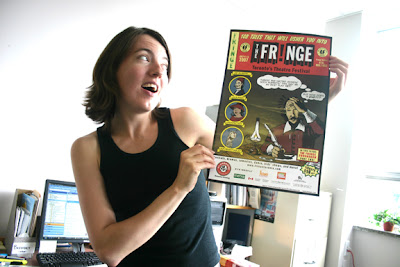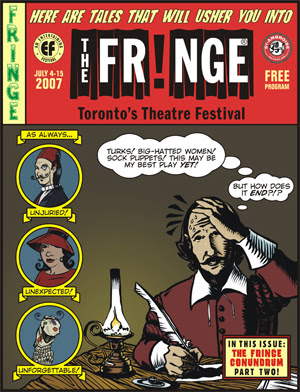 1) What the fuck is going on?
1) What the fuck is going on?
Somewhere along the way I thought that moving to a new apartment the same weekend as the Fringe load-in was a good idea . . .
2) How has the Fringe of Toronto Theatre Festival changed since you started working with it?
Definitely more artists are aware of what a useful and affordable development tool the Fringe is. Each year the number of applications we receive grows. This past year we received 550 applications to the Fringe lottery and the ongoing joke in the office was that your odds were better to win $1,000,000 in the Heart & Stroke Lottery than they were to secure a spot in the Fringe.
High-profile success such as The Drowsy Chaperone, JOB: The Hip-Hopera and da kink in my hair have also introduced the Toronto Fringe and the Fringe philosophy to a wider audience and can help explain the huge increases in applications from artists across Canada and around the world.
Here at home, local artists are finding it more expensive to develop work, hence applications from local companies have also skyrocketed as artists look to take advantage of the affordable and supportive environment the Fringe provides for these artists to create.
Also, since I started working for the Fringe I’ve personally made it a point to promote and celebrate the fact that the Fringe remains unjuried and that we return 100% of the ticket price back to the artists. It’s not uncommon to see us referring to ourselves as “Toronto’s Theatre Festival” (since we remain accessible to a much larger cross section of the population) and how we’re “unjuried, unexpected, unforgettable” on all of our marketing material. I think people have responded extremely well to these statements and to what the Fringe is all about.
Over the past seven years we’ve continued to set records in both attendance and in box office revenue and hope to sell over 50,000 tickets this July.
 3) How much cross-pollination is there going on between the various members of the Canadian Association of Fringe Festivals?
3) How much cross-pollination is there going on between the various members of the Canadian Association of Fringe Festivals?
Tons. The Canadian Association of Fringe Festivals holds an annual conference for Fringe producers to meet and share ideas. We fully support the “stealing” of ideas from one another and all of us all try to make it out to other Fringes to see them in action. It’s a fantastic networking group and from it such initiatives as the CAFF Touring Lottery (that allows companies to tour a minimum of five CAFF-affiliated Fringe festivals by filling in a single application) have taken root.
CAFF is such an attractive networking group that we have several American Fringe members who believe in the Canadian Fringe philosophy of remaining unjuried and returning 100% of the ticket price back to artists. I think it’s great that we have American members but sometimes it can create problems ;) . . . Flashback: two years ago when I spent almost half an hour at customs explaining that I was going to the Canadian Association of Fringe Festivals conference in Orlando, Florida. I guess that came across as being a bit dodgy and I realize now that I should’ve just said Disneyworld.
4) What are the most common mistakes you see being made by theatre artists participating in the Fringe?
They don’t read the Communiqués . . . by a long shot the most common mistake . . . please please please read the Communiqués.
5) What’s your single-fondest Fringe Festival memory?
At the spur of the moment in the beer tent, encouraging David Miller to put down his beer and appear on the “Late Night @ The Fringe with the Rumoli Bros.” He agreed, I walked him through the back hallway of the Tranzac (as the show was going on) and as the two of us hung out in the wings I waved my arms frantically trying to catch the Rumoli’s attention. They saw me, they saw Dave, they worked it and David made a kick ass appearance at the Fringe Club, complete with the “Mayor Look-Alike Contest” where some guy with no shirt and ripped baggy jeans won and walked away with Miller’s tie as the prize. Awesome.
6) Do you have any unifying theories about the artist-producer relationship?
Maybe not a unifying theory but a word of advice: if you find a good producer hang onto them as they are in serious short supply.
7) Do you believe in ghosts?
Hell yeah . . . I have some good stories, too . . .
 8) What theatre-related topic is most likely to propel you into a heated debate?
8) What theatre-related topic is most likely to propel you into a heated debate?
The loss of smaller to mid-size performance spaces. The Poor Alex and Artword Theatres were HUGE losses not only to the Fringe but to the entire indie theatre community.
Also, there is no reason why the Theatre Centre should be without a stable home, which has been the case for the past year or so. Props to everyone involved in setting up the Queen West Arts Centre.
9) Do you think conservative, right-wing politics are somehow fundamentally at odds with the arts community?
Yes. Ultimately I think it comes down to what our conservative, right-wing federal government perceives as being important in our society . . .
On one hand, there are many astute arguments justifying the importance of arts/culture within the Canadian society and how far-reaching the spiritual, communal, emotional and ECONOMICAL benefits of art are to our society.
On the other hand, our conservative, right wing federal government believes that spending money on a stylist to make sure Harper’s nose is powered properly is important.
Preventing Harper nose glare vs. the preservation and development of Canadian culture.
Sounds friggin’ at odds to me . . .
10) Is the newly minted Next Stage Festival meant to be a companion festival to the Fringe, or something quite distinct?
I think of the Next Stage Festival more as a companion to the Fringe organization and not to the Fringe festival itself. I’ll explain: many other Fringe festivals across Canada are produced by a larger entity. For example, the Manitoba Theatre Centre produces the Winnipeg Fringe and Fringe Theatre Adventures produces the Edmonton Fringe Festival.
Here in Toronto my co-worker Chuck McEwen and I realized that the summer festival itself was bursting at the seams and there simply wasn’t any more room to grow in that particular time slot. With the 20th anniversary of the Fringe festival on the horizon we though it would be an opportune time to re-brand ourselves so that the “Fringe of Toronto Theatre Festival” would become like an umbrella organization with a mandate to provide performance and development opportunities for artists.
The summer “Toronto Fringe Festival” would in essence become the crown jewel program of the organization. The newly minted Next Stage Festival would be a companion piece to the organization in that it adheres to the mandate of providing a performance and development opportunity but remtains distinct from its sister festival in the summer in that it is a juried and much smaller theatrical event.

To your point on question #6.
The scarcity of producers in the theatre scene speaks to a larger problem we’re having – which is our collective inability to attract people outside of the rather narrow definition of “theatre artist”.
Where are the accountants, producers, PR and marketing folks, business administrators, lawyers? Not running theatre companies, that’s where. So you end up with jack-of-all-trades theatre artists trying to do quality work while juggling a million tasks they haven’t been properly trained to execute. It’s a shame. I’m not decrying a lack of resources. Just puzzled, i guess, about why we can’t attract different kinds of professionals to our industry.
It’s got to be about more than just money.
I agree. Also, to talk some more about your point;
“So you end up with jack-of-all-trades theatre artists trying to do quality work while juggling a million tasks they haven’t been properly trained to execute.”
This is so true and such a dangerous trend I see taking root in our community. This is not the fault of ‘theatre artists’ themselves but so strongly indicative of the lack of trained personnel who have a through knowledge specifically of numbers, who can balance the books properly and can plan accordingly for the future. Without these trained people, the theatre artist themselves (whether they enjoy it or not) must take on the brunt of such planning and must divert some of their attention away from the artistic process in order to ensure that the bills are paid.
When you consider how major “operational” funding agencies such as the Toronto Arts Council, Ontario Arts Council, Cnd. Heritage etc. have shifted to three year multi-funding cycles, it is important now (more so than ever I think) for theatre groups to find producers who can work with artistic staff to develop and marry long term artistic vision with long term fiscal soundness and accountability.
I think money does play a huge role in it all. For example, my bookkeeping duties are only a small fraction of the producing work I do at the Fringe and it’s disheartening to know that in the for-profit world, this skill alone could garner me an annual salary that is comparable to my wage at the Fringe. Factor in all of the additional skills (i.e., event planning, marketing, HR) and I could score myself a very comfortable gig outside the theatre.
Hey Bridget,
It’s great to see people, like yourself, who’ve been able to marry a passion for theatre with dollars-and-cents realism.
And I agree with both Jon’s and your point that there’s a puzzling lack of business-minded folks in the theatre community. So, how do we solve the problem? Do we train people from within our community? Do we modify our offering to attract more business-orientated players? Or do we outsource the work to consultants? Is that an investment we need to make?
Artists just don’t seem that good with numbers . . . there are exceptions, of course. But, heck, even our education system emphasizes a dichotomy between business and art (by narrowly streaming scholastic disciplines, for example, and allowing no conceptual crossover between visual art and, say, math).
So not only is there a lack of business-oriented professionals is the theatre community, but “theatre artists” are suffering from systemic exclusion from basic business models and education.
Maybe we need to stop calling it a “theatre community”, which suggests we’re all in it to grow tomatoes for the greater good, and find a phrasing that’s inclusive of business theories and methods.
Thoughts?
Ian
P.S. I’m all for tomatoes for the greater good, I just think we might need to toughen up our language so we don’t present like we’re all part of some flower-power hippie commune. “Theatre community” – anyone got a better phrase?
I think Jon and Bridget are very much right – though I deny the “artists aren’t good at numbers” stuff – I think it re-enforces much more dangerous stereotype than the word community. I’m fine with numbers.
It’s that as a director and maker of theatre, I could do that better (more rigorously) were I not spending so much time and energy looking at spreadsheets or writing press releases or making all the phone calls and work involved in producing.
This really seems to be a pressing issue – since I believe that there is a generation shift coming and it needs producers to create the space for artists to make work good enough to be worthy of that shift.
And Jon is right – it’s not just about cash – it’s about time and care (both of which cash can rent, but aren’t exclusive) – a desire to make sure the work gets done and drive to make it. I think often of the creation story told by DaDa Kamera (of Sherry overhearing Daniel M saying he was going to give up cause he was tired of producing and her deciding that shouldn’t happen) – I wonder if that happens now, or if we’ve become so “career” minded that the admin grads intern at some large theatre, and then get an entry level job there, and then move up the ladder- that there is a distance created by the economic models between the admin and the passion for the art (and especially the cutting edge of contemporary work)
And of cource Bridget is right – she could be making better money for less work in almost any field (please, for the love of god don’t) – but so could I, so could most of us. Theatre is a terrible career choice. But there are other things that matter, and I feel we need to articulate that more often.
and also of course – instead of writing this, I should be doing rehearsal prep for my fringe show, or at least follow up emails with presenters…
jacob is totally right on with the “artists are bad at numbers” stereotype being unaccurate and unhelpful, but the real problem is that we can’t fully dedicate ourselves to a craft if we’re bogged down in a tidal wave of producing type duties. i hope to fuck he’s right about the generational shift…
ian, i have to differ with your POV on us being a not being a “community”. there’s no way praxis could have put on Steel without being part of a community. we were donated practically everything we needed to transform a large room into a theatre by other like-minded and friendly co-practitioners. That hippy dippy shit paid off in a real dollars and cents economic way.
Hi Jacob, Mike,
Perhaps I should soften my position on this. These are ideas-in-progress, and I appreciate your taking the time to offer feedback and counterpoints.
I think our current economy privileges specialists over generalists. But the current state of Toronto’s theatre scene seems to require a generalist’s approach. I think it puts us at odds with contemporary business models. I’m interested in learning more about how to attract business specialists to work in independent theatre.
My statement about artists being bad with numbers is obviously a sweeping generalization. But it’s based on my experience with arts education and anecdotal experience with artists and artist-run collectives. There rarely seems to be anyone driving the business end of the bus – or no one dedicated to that, anyway. I think it’s an oversight we allow ourselves to make because we have (as a group) bought into a false dichotomy between business and art.
As for community. I’m not suggesting that we abandon a sense of community, or give up the benefits of community, but I think it’s worthwhile asking ourselves what we mean when we call it a “theatre community.” What is included under that umbrella? And, perhaps more important, what’s excluded?
It’s the same problem Toronto’s gay community has been having. Does a “gay community” include gay men? What kind of gay men? Women? Trans? Bisexuals? Are there ethno-cultural assumptions being made? Class distinctions being made?
The question I’m asking is this: Is Toronto’s independent theatre community making assumptions about itself that are excluding people who might otherwise have very important contributions to make?
Ian